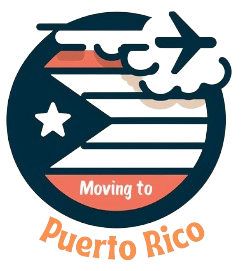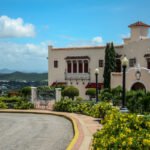Are you considering swapping your current scenery for the tropical allure of Puerto Rico? You’re not alone. The enchanting island, rich with vibrant culture and scenic beauty, is a popular destination for those yearning for a change in lifestyle without leaving U.S. territory.
However, the decision to move calls for diligent planning and a well-rounded understanding of what life in this paradise entails.
Surprisingly, as an American citizen, you won’t need a passport or work permit to call Puerto Rico home—a fact that simplifies the transition enormously. This blog aims to be your compass through the complexities of relocating—from handling logistics to embracing local customs—ensuring your move is seamless and stress-free.
Dive into our ultimate guide where serenity meets strategy: welcome to your new chapter in Puerto Rico! Keep reading; there’s so much more we can’t wait to share with you!
Key Takeaways
- US citizens can easily travel to Puerto Rico without needing a passport or work permit, which simplifies travel and the transition process immensely.
- In order to benefit from PR’s tax incentives, one must become a bona fide resident of the island by living there for at least 183 days per year and meet certain qualifications.
- When relocating, it’s necessary to exchange your driver’s license for a local one at the DTOP, carry cash for daily transactions since it is widely preferred over credit cards, and have some Spanish language skills as it enhances day-to-day interactions.
- The standard of living in Puerto Rico includes the absence of heating systems due to warm temperatures year-round, with propane stoves commonly used in kitchens instead.
- Understanding healthcare options on the island is critical as you prepare to move; familiarize yourself with medical insurance available in Puerto Rico.
Important Facts to Know Before going to Puerto Rico
When getting to Puerto Rico, there are several important facts to consider before making the transition. From different currency practices and language preferences to unique kitchen appliances and driver’s license challenges, being aware of these factors can help smooth out your move.
You Don’t Need a Passport
Traveling to Puerto Rico is a breeze for US citizens since it’s part of the United States territory. You’ll save time and avoid extra paperwork because you won’t need to worry about international travel restrictions, like having a passport or dealing with foreign visa applications.
Just pack your bags, book your ticket, and you’re ready to explore the pristine beaches of Vieques or dive into the vibrant culture of San Juan.
Your move can be much simpler without these complications; imagine easier trips back home or inviting friends and family to visit without them needing passports either. This convenience extends beyond just travel – as a U.S. resident relocating within American borders, your transition involves less red tape and smoother logistics compared to moving abroad.
Next up: let’s look at some tax intricacies awaiting you in Puerto Rico.
Puerto Rico’s Tax Benefits Come with Strict Requirements
If you dream of keeping more of your hard-earned money, Puerto Rico might catch your interest with its tax incentives. However, these attractive benefits come with strict qualifications.
For starters, to be exempt from U.S. federal income tax on dividends and capital gains, you must become a bona fide resident of Puerto Rico. This means living there for at least 183 days out of the year.
Becoming eligible for these breaks requires that you haven’t lived in Puerto Rico during the previous 15 years. Plus, all your Puerto Rican-sourced income must face taxation at local rates.
It’s not just about packing up and moving; it’s about fulfilling precise legal criteria established by both the federal government and commonwealth tax laws to enjoy those coveted tax-exempt perks on island-generated personal income.
Next, understand that getting a driver’s license presents its own set of challenges..
Getting a Puerto Rico Driver’s License is Not Easy
Driving in Puerto Rico means you’ll need to swap your stateside driver’s license for a local one, and this process can bring about some hurdles. Expect multiple visits to the Departmento de Transportación y Obras Públicas (DTOP), where patience is key due to long wait times and potential language barriers if Spanish isn’t your strength.
You must provide specific documentation such as a notarized letter stating why you’re in Puerto Rico, along with your social security card, birth certificate or passport, and proof of residency.
Don’t forget too that car registration follows right after getting licensed — another crucial step for driving legally on the island. Ready yourself for similar procedures at the DTOP office, including more forms and possible inspection requirements.
Transitioning smoothly requires awareness of these processes; they are just part of settling into your new lifestyle.
Cash is used more than credit cards
In Puerto Rico, cash is the preferred method of payment over credit cards. It’s essential to have cash on hand for everyday transactions, as it is widely used in local businesses and markets.
While credit cards are accepted at many places, especially in larger cities and tourist areas, having cash available will ensure you can make purchases without any inconvenience.
When traveling or relocating to Puerto Rico, it’s important to plan ahead by withdrawing sufficient amounts of cash from ATMs or banks to cover your expenses, especially if you plan on exploring more remote areas where card acceptance may be limited.
Some knowledge of Spanish can be helpful
While cash is often preferred over credit cards in Puerto Rico, having some knowledge of Spanish can also be helpful. Although not mandatory, being able to communicate in Spanish can enhance your experience and help you navigate daily interactions more easily.
This includes everything from understanding signage and public announcements to communicating with locals in various settings. With the official languages being Spanish and English, knowing at least some basic Spanish phrases can go a long way in making your transition smoother.
Puerto Rican Spanish has its own unique nuances and dialects, so it’s important to familiarize yourself with these differences compared to other variations of the language. While resources for learning Puerto Rican Spanish may be less abundant than those for other forms of the language within the United States, there are still opportunities available through local classes or online platforms that cater specifically to this regional dialect.
No need for heating systems
Considering the warm and tropical climate of Puerto Rico, you won’t need a heating system. The consistent high temperatures throughout the year mean that homes rarely require heating, providing a natural way to stay comfortable without the need for extra equipment or costs.
With average temperatures ranging from 70°F to 85°F (21°C to 29°C) in coastal areas, you can enjoy the pleasant weather without any reliance on heating units, making it an ideal environment for those seeking a temperate climate all year round.
Propane stoves are commonly used in kitchens due to the absence of central heating systems. This cookware option aligns with the local lifestyle and provides efficient cooking solutions tailored to the island’s unique climate and living arrangements.
Propane stoves are common in kitchens
Propane stoves, equipped with tanks instead of relying on natural gas lines, are a common sight in Puerto Rican kitchens. This is due to the wide usage of propane as the primary heating fuel throughout most of the island, which is attributed to its tropical climate.
Unlike many American cities and towns where natural gas stoves are connected to underground gas lines, using propane tanks for kitchen stoves is more prevalent in Puerto Rico.
Catering to the unique requirements of living in a tropical environment, propane stoves with tanks have become a part of everyday life for residents across Puerto Rico. As you prepare for your move, it’s important to note this difference in kitchen setups compared to what might be typical back home.
Living in Puerto Rico
Puerto Rico delivers a unique experience with its vibrant culture, beautiful landscapes, and warm climate. From healthcare to education, there are various aspects of daily life that you should consider before making the move.
For more information on living in Puerto Rico, keep reading!
Communication
Puerto Rico is predominantly Spanish-speaking, so it’s important to familiarize yourself with the language and customs. Understanding Puerto Rican culture and social etiquette is crucial for effective communication.
Expats can offer valuable insights into cultural adaptation and provide guidance on how to navigate language barriers. Before relocating, take the time to learn about Puerto Rican customs, beliefs, and values to communicate respectfully and avoid misunderstandings.
Learning about the language, culture, and etiquette of Puerto Rico plays a vital role in successful relocation. By understanding social protocols and customs regulations upfront, you pave the way for smooth communication upon your arrival on this vibrant island.
Healthcare
Transitioning from understanding communication to navigating the healthcare system in Puerto Rico is vital for expats. The island offers various hospitals, clinics, and pharmacies, making healthcare services accessible.
Expats moving to Puerto Rico should note that the healthcare system on the island is 100% managed care, with limited choices available for beneficiaries.
The healthcare system stands out as one of the best in the Caribbean, providing quality medical options. It resembles what you would find on the US mainland and ensures reliable and accessible healthcare services for those relocating to the island.
While Puerto Ricans generally have poorer health status than other US Hispanic and non-Hispanic populations, it’s essential for expats to familiarize themselves with medical insurance options available on the island.
Education
The education system in Puerto Rico follows the American model, requiring children from ages six to 17 to attend school. With over 1,400 public schools providing free primary and secondary education for all, there are ample educational opportunities available.
Homeschooling is not regulated by law in Puerto Rico, and homeschool students do not have the right to participate in public school activities and classes. For those seeking higher education, various resources help students find scholarships and identify popular colleges.
Moving on to living arrangements, let’s delve into everything you need to know about communication in Puerto Rico.
Moving to Puerto Rico
The process of moving to Puerto Rico may seem daunting at first, but with the right information and planning, it can be a smooth transition. From understanding the length of stay requirements to finding reputable international movers and securing moving insurance, this section will provide you with everything you need to know before making the move.
Process of moving
When moving to Puerto Rico, the process involves several important steps and considerations:
- Obtain Proper Documentation: Ensure you have the necessary identification, paperwork, and visas required for relocating to Puerto Rico. Familiarize yourself with customs regulations for shipping belongings to the island.
- Understand Lifestyle and Environment: Take time to learn about the unique lifestyle and environment of Puerto Rico. Consider factors such as weather, transition, and cultural differences.
- Shipping Furniture: Research the cost of shipping furniture to Puerto Rico and evaluate the pros and cons of bringing your own furniture versus purchasing locally.
- Plan Your Transition: Create a detailed plan for your transition, including arrangements for accommodation, transportation, and essential services upon your arrival in Puerto Rico.
- Acclimate to Island Living: Embrace the tropical lifestyle by exploring local amenities, getting involved in community activities, and adapting to the friendly and lively culture of Puerto Rico.
Length of stay
Puerto Rico’s tax benefits require individuals to live in the territory for at least 183 days a year. Meeting this residency requirement is crucial for those seeking to take advantage of the tax incentives offered by Puerto Rico, including significant reductions in corporate and individual taxes.
Being in Puerto Rico for an extended period also allows individuals to immerse themselves in the vibrant culture and unique lifestyle of the island, providing a deeper understanding of its rich heritage and warm community.
An extended period of residency provides individuals with a deeper understanding of the island’s culture and lifestyle. This includes experiencing local traditions, such as enjoying traditional cuisine like mofongo or exploring natural wonders like El Yunque rainforest.
International movers
When it comes to making the big move to Puerto Rico, finding reliable international movers is crucial for a smooth transition. You’ll need a professional moving company with experience in international relocations and familiarity with the specific requirements of moving to Puerto Rico from the USA.
Look for reputable movers who can handle all aspects of your move, including packing, shipping, customs clearance, and delivery to your new home on the island.
Consider seeking out reviews and recommendations from other expats who have made similar moves to Puerto Rico. It’s important to choose movers who are knowledgeable about the logistics of shipping items overseas and have a proven track record of providing efficient and reliable services.
Importance of moving insurance
Moving insurance is a crucial safeguard for your belongings during the relocation process to Puerto Rico. It can cover the cost of items lost or damaged, providing peace of mind and financial protection.
Consider additional insurance for full coverage of valuable items and be informed about different types available to choose the most suitable option for your specific needs when moving to Puerto Rico.
Your new address in Puerto Rico may impact health coverage options and savings, so it’s essential to consider the implications for your insurance. Moreover, excellent value health insurance options are available on the island, benefiting both expats and residents.
Things to Know About Moving to Puerto Rico
Moving to Puerto Rico means experiencing a lower cost of living, and immersing yourself in a friendly and lively culture. Find out more about what life on the island has to offer by reading on!
Cost of living
Living in Puerto Rico gives you a relatively lower cost of living compared to many other Caribbean islands, making it an appealing choice for expats. The total monthly living expenses typically range from $1,280 to $6,160, covering housing, groceries, transportation, and entertainment.
With affordable grocery shopping and dining options available on the island, your budget can stretch further than you might expect. Expats who have embraced life in Puerto Rico emphasize that while maintaining a high standard of living is achievable here, far less is spent on day-to-day necessities.
Factorizing the cost of living into your financial planning becomes crucial as you consider relocating to Puerto Rico. Understanding these expenditure ranges will aid in crafting an accurate budget before making the move.
Finding work
Transitioning from considering the cost of living to finding work in Puerto Rico requires understanding the employment landscape on the island. Puerto Rico boasts a thriving market for remote work, particularly within San Juan, which has been named the top place for remote work in the U.S. As you plan your relocation, keep in mind that there are abundant opportunities for individuals interested in both traditional and remote employment within this vibrant community.
Opportunities abound with various industries offering employment prospects. Remote work is especially prevalent and opens up an array of career choices for those opting to make Puerto Rico their new home.
Easy transition
Transitioning to life in Puerto Rico is surprisingly smooth, with most of the everyday essentials easily accessible. Embracing the vibrant lifestyle and friendly local culture will make you feel at home in no time.
You can also benefit from a lower cost of living compared to many U.S. states, making the transition even more appealing.
For those who aim for a seamless move, understanding the process of moving and finding reliable international movers are crucial steps to ensure a stress-free transition to your new island home.
Caribbean lifestyle
Relocating to Puerto Rico offers you the chance to embrace a laid-back lifestyle that’s all about embracing the moment. With year-round sunshine and breathtaking beaches, you’ll find yourself adjusting to a slower pace, where relaxation and enjoyment take center stage in your daily routine.
The island’s vibrant culture and welcoming community create an environment that encourages outdoor activities such as water sports, exploring historical sites like Old San Juan, or simply savoring the local cuisine filled with flavors of plantains and fresh seafood.
Embracing this enchanting way of life means allowing yourself the opportunity to immerse in new experiences at every turn. From mingling with friendly locals known for their warm hospitality to discovering hidden gems off the beaten path, you’re opening up a world of possibilities by choosing Puerto Rico as your new home.
This unique lifestyle is what makes living on the Island of Enchantment truly remarkable – providing an unparalleled quality of life with unforgettable memories waiting around every corner.
Friendly and lively culture
Puerto Rico’s culture is a colorful tapestry of old and new, blending indigenous, Spanish, African traditions. The vibrant festivals, music, and celebrations reflect the island’s friendly and lively atmosphere.
The laid-back lifestyle and stunning beaches further contribute to the warm and inviting culture associated with Puerto Rico.
The island offers a rich and diverse culture influenced by Spanish, African, Taino, and American customs. This mix creates a welcoming environment for newcomers looking to immerse themselves in a dynamic community that embraces tradition while also celebrating modern influences.
Conclusion
In conclusion, moving to Puerto Rico offers an exciting opportunity for a warm and colorful lifestyle change without the need for a passport or work permit. The practical insights provided in this guide will help you navigate potential challenges with ease, making your relocation efficient and stress-free.
By embracing these strategies, you can ensure a smooth transition and fully enjoy the rich cultural experience that Puerto Rico has to offer. We hope this guide has equipped you with the essential knowledge needed for a successful move, and we encourage further exploration of resources or services tailored to your specific needs.
Take action today and embark on this new adventure with confidence—Puerto Rico awaits!
FAQs
1. What do I need to know about taxes when moving to Puerto Rico?
When you move to Puerto Rico, you’ll find different tax rules like corporate tax rates, and may get tax exemptions or credits. If self-employed or running a business, understand Form 1099 requirements and gross revenue taxation.
2. Will I still pay U.S. taxes if I am a resident of Puerto Rico?
Puerto Rico is a commonwealth of the United States, so U.S. citizens are not double-taxed on their income earned there but must be aware of local levies such as property taxes and sales tax.
3. How can I ship my belongings to Puerto Rico?
You can use freight services for large items; mail smaller ones using mailing companies that serve the island including cargo shipping through automated export systems; don’t forget Luis Munoz Marin Airport handles air shipments too!
4. Can I drive with my current driver’s license in Puerto Rico?
Yes, at first—but plan to get a new driver’s license from Puerto Rico soon after moving since it’s part of the process to fully settle in.
5. Are there any big retailers where I can shop in Puerto Rico?
Certainly! You’ll find familiar stores like Walmart and Walgreens throughout major cities like Ponce plus lots of local bodegas for everyday needs.
6. How does buying property work in Puerto Rico?
For buying property, connect with an estate agent or mortgage broker who understands joint property laws and investment opportunities—you might need a lawyer or notary too—and remember prices vary just like anywhere else!

Pablo Sierra is the writer and creator of the blog Moving to Puerto Rico, where he assists others in relocating to the island by providing advice and sharing his first-hand experiences.
Originally from Arecibo, Puerto Rico, Pablo has spent most of his life living on the island. His passion for the vibrant Puerto Rican lifestyle and helping newcomers adjust inspired him to start Moving to Puerto Rico. On the blog, Pablo taps into his insider-knowledge as a native to offer tips on the best neighborhoods, navigating the local culture, finding the top beaches and trails, and more.
To learn more about Pablo and connect with him on all things related to moving to and living in Puerto Rico, check out his website, www.movingtopuertorico.net.










